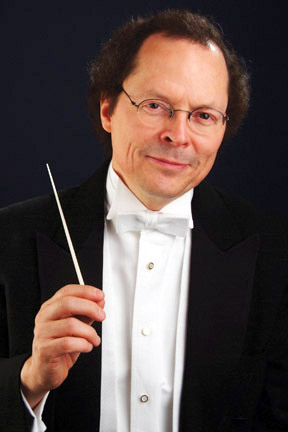Washington Bach Consort begins a new era with “St. Matthew Passion”

Kenneth Slowik led the Washington Bach Consort in Bach’s “St Matthew Passion” Sunday at the National Presbyterian Church.
Bach’s St. Matthew Passion is a work of countless intricacies. Coordinating its two orchestras, three choruses, and multiple soloists is hard enough. Doing so as the replacement conductor for the Washington Bach Consort, which lost its beloved director, J. Reilly Lewis, suddenly last year, is even more daunting.
Kenneth Slowik, leader of the chamber music program at the National Museum of American History, did just that on Sunday afternoon, as stained glass-colored light filled the National Presbyterian Church.
Recent scholarship by Daniel R. Melamed, a musicology professor at Indiana University, has shown that Bach’s two main choruses were not equal: a small main group also sang the solo parts, and a second, possibly larger chorus functioned like a ripieno group. The Bach Consort instead fielded the traditional pair of equal choruses, of twelve singers each, standing behind the two orchestras, both separated by a narrow division in the chancel space. Six additional singers performed the solo pieces, intense commentaries on the actions from the Gospel account of Christ’s death.
The marquee moments came from mezzo-soprano Luthien Brackett, who produced a rounded sound in the alto arias, warm and full into the lower range and equal in power all the way to the top. Her first aria, “Buß und Reu,” was a marvel, her potent voice married to the two beautiful transverse flutes, played by Colin St-Martin and Kathryn Roth. Her aria “Erbarme dich” in the second half was the heart of the work, as it should be, a motherly embrace between God and a repentant sinner. Concertmaster Andrew Fouts had an equally glowing tone on the violin solo in this piece, although he tended to rush the beat in a disconcerting way.
Jolle Greenleaf showed an attractive, boy treble-like tone on the soprano arias, floating effortlessly and pitch-perfect on the high notes of “Aus Liebe” in the second half. Tenor Aaron Sheehan produced a heroic sound when he needed it, as in the impassioned recitative “O Schmerz!,” over the lamentation of the chorus. Sheehan could also purr through the legato runs at the top of the range, the hardest challenge in Bach’s writing for tenor, as in the aria “Ich will bei meinem Jesu wachen.”
Bass-baritone Paul Max Tipton was capable on the bass arias, but did not always display the clarity of pitch needed to negotiate the chromatic passages, as in the aria “Gerne will ich.” Tenor Robert Petillo, isolated in the pulpit above the chorus, was a consistent but distant presence as the Evangelist, able to vault the part’s highest notes into the air. Baritone Christophèren Nomura’s Jesus was noteworthy for its loud rumbles, rather than its subtlety or accuracy, a roughness that even Bach’s “halo of strings” accompanying his recitatives could not soften.
The amassed chorus had the most compelling sound when it sang together in the chorales that run through and unify the work, supported by the entire orchestra. In the opening chorus “Kommt, ihr Töchter,” likened by conductor John Eliot Gardiner to a grand altarpiece by Veronese or Tintoretto, the sound was often overwhelming. The third chorus, which sang the chorale “O Lamm Gottes, unschuldig” in this movement, was almost inaudible, even placed in front of the conductor’s podium. Some distance from the ensemble, reflecting Bach’s placement of this choir in the far away “swallows’ nest” organ loft at Leipzig’s Thomaskirche, may have helped.
Conducting with his hands, Slowik had some initial trouble keeping his forces aligned rhythmically but things eventually solidified. Slowik often took the fermatas in the chorales as long holds, his extension of many final chords adding to an already expansive performance which ran to three hours. Apart form some imprecision in the oboes da caccia and violas da gamba, the instrumental sound was generally excellent.
Washington Bach Consort performs Handel’s Messiah 3 p.m. April 30 at National Presbyterian Church. bachconsort.org



Posted Mar 14, 2017 at 8:24 am by Laura Youens
This review is spot-on. I told my husband that I was glad the majority of arias in this work are for mezzo-soprano/alto. Luthien Brackett was a marvel, and “Erbarme dich,” as it should, brought me close to tears.
Posted Mar 14, 2017 at 3:23 pm by Robert Petillo
Mr. Downey, out of curiosity, just where would you have preferred the Evangelist to sing from (without sitting on someone’s shoulders)?
Posted Mar 24, 2017 at 7:34 pm by Patricia Ann Neely
Too bad! I thought the violas da gamba captured the spirit of each of the arias in which the instrument is featured. I really enjoyed playing Geduld…one of the peak experiences.